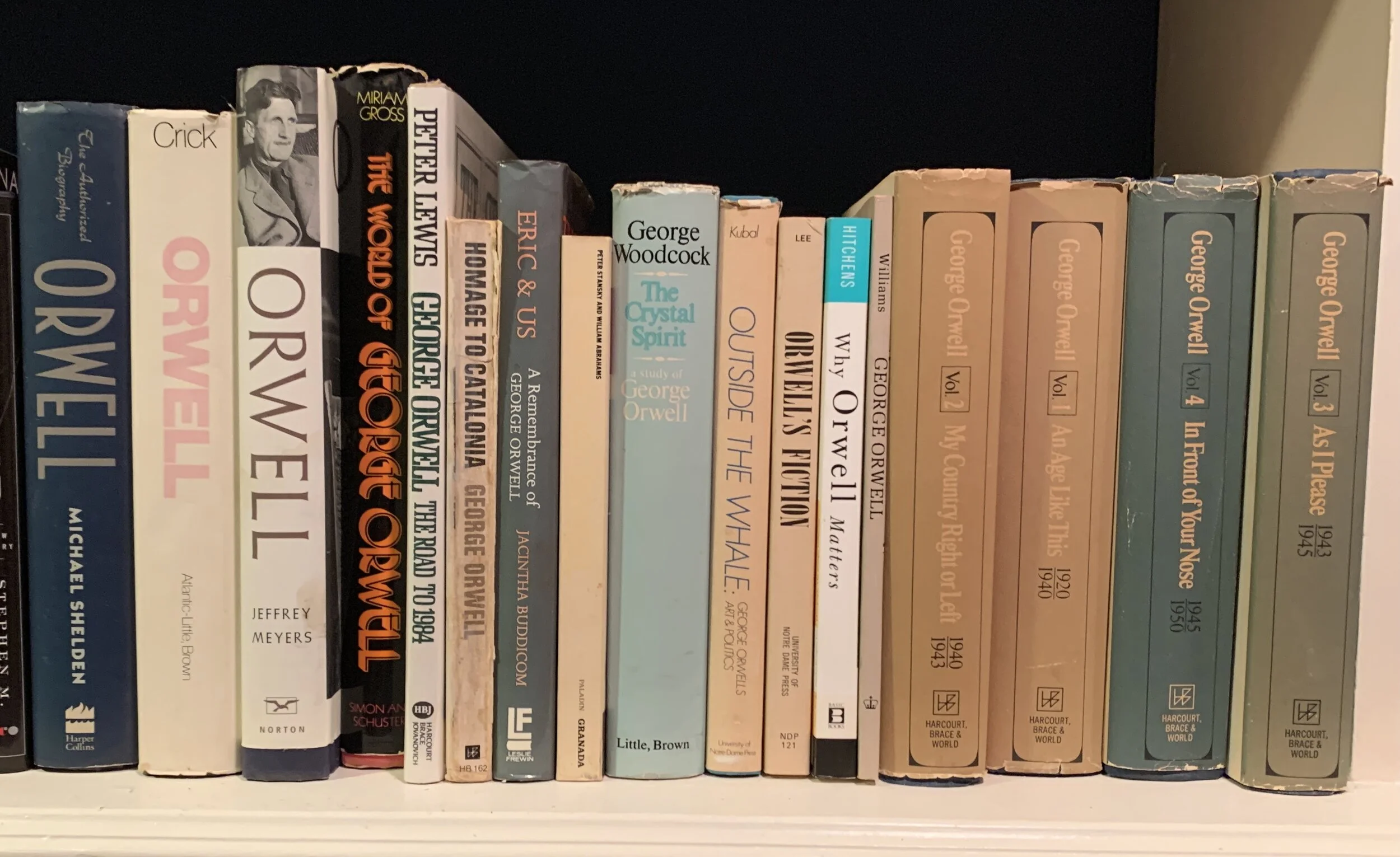WWOD - What Would Orwell Do?
Whenever I have the need for clear thinking and clear writing, I turn to George Orwell. He's one of my intellectual heroes.
I’m pleased that his novel 1984 is once again a bestseller. I think the more people are exposed thoughts on politics, languages, literature, and culture, the better.
It's also appropriate to wonder what what he would think about today’s events and trends. How would he respond to the Republican-enabled Trump now on display here in the USA?
Christopher Hitchens took on a related topic in is 2002 book Why Orwell Matters. There he attempted to objectively assess Orwell's status. In that book’s introduction Hitchens wrote:
This is not a biography, but I sometimes feel as if George Orwell requires extricating from a pile of saccharine tablets and moist hankies; an object of sickly veneration and sentimental overpraise, employed to stultify schoolchildren with his insufferable rightness and purity.
While the above passage is an example of Hitchens occasionally overwrought writing (a practice to which the mature Orwell would rarely succumb) Hitchens does have one thing right: Orwell has been over-deified. Some of those reading 1984 for the first time, for example, may miss the grim satire of Orwell's own time embedded in the pages, given that book’s strong focus on Big Brother and the "future totalitarian state" elements of the story.
That's fine by me. Again, speaking as a fan, anything that gets people to read Orwell is justified.
On to the question, “What Would Orwell Do?” For example, would Orwell be "anti-Trump" were he alive today?
That may be too simplistic a question to ask. As perceptive as Orwell was, I’m not sure he could have immediately comprehended how social and communication media would evolve to what they are today. For example, given how decentralized communication has become, the Ministry of Truth’s "top-down" control over history, language, and content, as portrayed in 1984, would be a challenge. Even the Chinese today have difficulty with totally censoring access to the Internet. Nor did Orwell see how some business and industry organizations would evolve as willing handmaidens of political movements as has been the case, for example, with Fox News.
That he did not portray developments like these in 1984 was not due to a lack of imagination but to his particular cultural view, rooted as he was in an England on its last legs as an empire. Unlike many of his generation, he actively engaged and experienced his world in ways that stretched his thinking and informed his writing. Examples are his experiences in Burma, his fighting in the Spanish Civil War, and his repeated attempts to experience firsthand the lives and experiences of the "lower classes." All these experiences colored his later writing and political thinking.
But what would he think about what's going on today? He was certainly no stranger to propaganda himself, as his work at the BBC’s Eastern Service during World War II shows. But unlike many on the “Left” of his day, his views of both Hitler and Stalin were negative, despite the Soviet Union’s being a World War II ally. Read some of his “As I Please” newspaper columns written during World War II from his London vantage point. He was willing to call out both the Right and the Left for hypocrisy. Also, review the difficulties he had in getting his short novel Animal Farm published as it was viewed by some publishers on the Left in England as being too obviously "anti-Stalin."
My guess is that, were Orwell writing today about current U.S. politics he would be acutely sensitive to hypocrisy and language manipulation from both sides of the aisle. An easy target for him would be how often politicians lie and how often their followers swallow or overlook their lies. Most likely he would be merciless in his pillorying an easy target like Trump. I’d like to think he would also target the complicity of the “mainstream media” and its misguided attempts at "balance."
What Orwell would be crystal clear about is that, at the end of the day, politicians are all about power and how that power is wielded. Had he attended Trump outdoor rallies during the 2016 U.S. presidential campaign and witnessed how Trump whipped up crowds into a frenzy of seething hatred of Hillary and the media, he may have been reminded of Hitler’s Nuremberg rallies and 1984’s "two minute hates."
But the "left" would no doubt be a target of his pen’s ire as well. He might see parallels between the struggles of “flyover states” in the U.S. just as he attempted to experience firsthand the working poor in Wigan Pier in Northern England in the 1930’s.
As Hitchens points out, Orwell was no saint. He did have an unusual appreciation of how language, politics, and literature interact. His novels, essays, and other writings, including his invention of Newspeak, all attest to that. Fortunately he put that understanding into words that are still relevant to us today.
Copyright © 2017 by Dennis D. McDonald. A later version of this post was published by aNewDomain and is available here.





